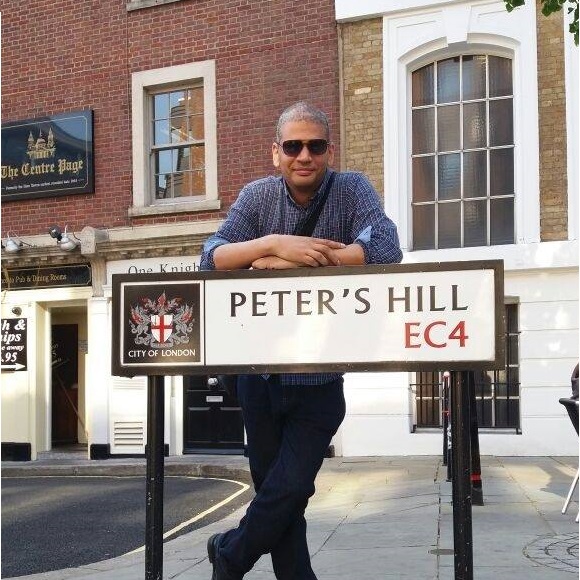Peter Levrai
I’ve been working in ELT since 1995 and have worked across Europe and Asia, from Ireland to Macau, Lithuania to Azerbaijan. I’ve taught in a range of different contexts from private language schools to corporate training and the university sphere. I have a strong interest in course development, obtaining my Masters in English Language Teaching & Material Development, and have two published coursebooks, English for the Energy Industries and Academic Presenting & Presentations. I also receive the British Council ELTons Award for Innovation in Learner Resources in 2018 for the English for Academic Purposes course I co-wrote – Develop EAP: A Sustainable Academic English Skills Course. It was through the development of this course that my interest in collaborative learning began. I completed my Phd in Language Acquisition in Multilingual Settings in 2025, focussing on the assessment of collabroative assignments in EAP. Through my research I was able to identify the dimension of teacher collaborative assessment identity and developed a collaborative assessment algorithm, which is a series of considerations and decision trees to help in the development of fair and effective assessment schemes for collaborative assignments.
Research Interests
I am a PhD graduate in the Language Acquisition in Multilingual Settings (LAMS) programme from the University of the Basque Country, supervised by Professor María del Pilar García Mayo. The title of my dissertation is “Exploring practitioner collaborative assessment identity to develop a principled multi-lens approach to assessing collaborative assignments in English for Academic Purposes”.
My interest is in collaborative learning, with a particular focus on the teacher’s perceptions and approaches to assessing collaborative assignments. As collaborative assignments grow more prevalent on university courses it’s important to examine teacher attitude to collaboration and how those assignments are assessed with the aim of developing an assessment framework to help teachers implement collaborative assignments. My hope is that by developing a better understanding of how collaborative assignments can be and should be assessed will help overcome one of the main barriers to wider acceptance of collaborative assignments.
Journal Papers
- Averil Ester Bolster, Peter Levrai. (2018) A framework to support group essay writing in English for Academic Purposes: a case study from an English-medium instruction context. Journal of Assessment and Evaluation in Higher Education. 44(2):186-202. Abstract || PDF
- Averil Ester Bolster, Peter Levrai. (2017) A Slow (R)evolution: Developing a Sustainable EGAP Course . The European Journal of Applied Linguistics and TEFL. 6:147-166. Abstract || PDF
Book Chapters
- Averil Ester Bolster, Peter Levrai. (2022) Innovation, exploration and transformation: Proceedings of the BALEAP 2019 Conference. Ed.: Michelle Evans, Bee Bond and Alex Ding. Pub.: Garnet Education. Pags: 95-104. Abstract || PDF
- Averil Ester Bolster, Peter Levrai. (2022) Fast-forwarding toward the future of EAP teaching in “the happiest country in the world”. Ed.: James Fenton, Julio Gimenez, Katherine Mansfield, Martin Percy, Mariangela Spinillo. Pub.: Routledge. Pags: 11-24. Abstract || PDF
- Averil Ester Bolster, Peter Levrai. (2019) Student Collaboration in English for Academic Purposes – Theory, Practitioner Perceptions and Reality. Ed.: Mike Nelson. Pub.: Turun yliopisto. Pags: 9-26. Abstract
- Peter Levrai, Averil Ester Bolster. (2018) Developing A Sustainable EGAP Course. Ed.: Tania Patterson. Pub.: . Pags: 149-151. Abstract
Conference Papers
- Peter Levrai. (2024) Hybrid Assessment: the key to assessing collaborative assignments. NFEAP summer conference Oslo. Abstract || PDF
- Peter Levrai. (2024) The thorny issue of assessing collaborative assignments: a way forward. IATEFL TEASIG & ESPSIG Conference Winterthur, Switzerland. Abstract
- Averil Ester Bolster, Peter Levrai. (2024) Supporting ethical and developmental AI use with the AI Quality of Engagement Matrix. Theory into Practice (TiP) Blog Online Blog. Abstract || PDF
- Averil Ester Bolster, Peter Levrai. (2023) Be the change you want to see: ways of practising for teachers. BALEAP PIM: EAP for a more sustainable world Online. Abstract || PDF
- Averil Ester Bolster, Peter Levrai. (2023) That thing we don’t talk about – facilitating and assessing student collaborative assignments. BALEAP 2023 Conference Warwick University. Abstract || PDF
- Averil Ester Bolster, Peter Levrai. (2023) Key takeaways from “Fast-forwarding toward the future of EAP teaching in ‘the happiest country in the world’”. FINELC Language Centre Days Helsinki. Abstract || PDF
- Averil Ester Bolster, Peter Levrai. (2023) A Sustainable Course in Action: English for Multidisciplinary Teams. FINELC Language Centre Days Helsinki. Abstract || PDF
- Peter Levrai, Averil Ester Bolster. (2022) Creating a space for student collaboration. FINELC Language Centre Days Vaasa. Abstract || PDF
- Averil Ester Bolster, Peter Levrai. (2022) Supporting teachers to support student collaboration. XVII CercleS INTERNATIONAL CONFERENCE Porto. Abstract || PDF
- Peter Levrai, Averil Ester Bolster. (2021) EAP Practitioner Attitudes to Collaborative Assignments: Tensions and Opportunities. BALEAP University of Glasgow. Abstract || PDF
- Averil Ester Bolster, Peter Levrai. (2021) Setting the stage for student collaboration. Norwegian Forum for English for Academic Purposes Oslo. Abstract || PDF
- Averil Ester Bolster, Peter Levrai. (2019) Are we talking about the same thing: researcher and teacher perspectives of student collaboration. BALEAP Univeristy of Leeds . Abstract || PDF
- Averil Ester Bolster, Peter Levrai. (2019) A definition for student collaboration in EAP: Implications for practice. EAP in Ireland University of Cork. Abstract || PDF
- Averil Ester Bolster, Peter Levrai. (2018) Looking Behind The Curtain: using technology to facilitate assess group essay writing in EAP. IATEFL / ZHAW Conference Zurich. Abstract || PDF


